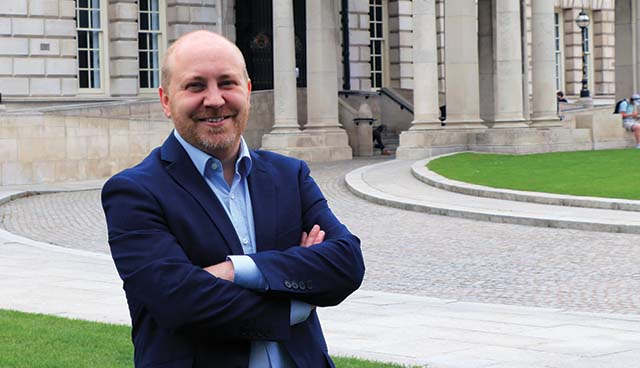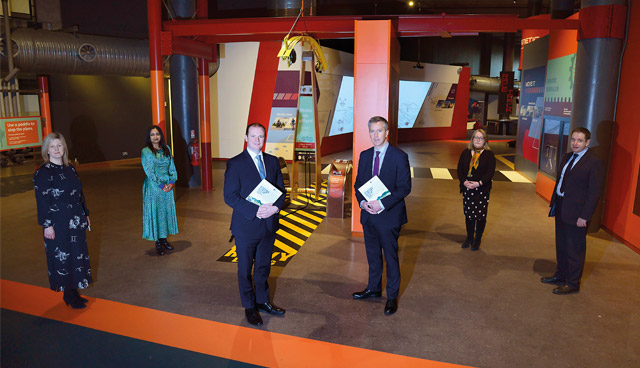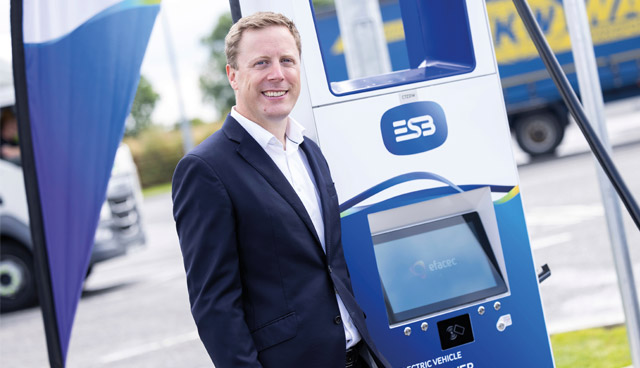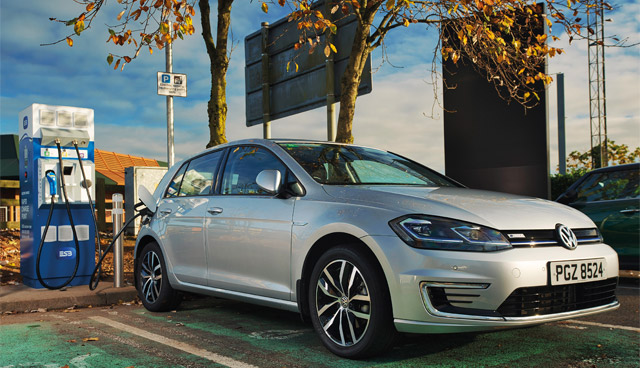
Powering a green economy
8th March 2022
Energy action plan includes plans for RESS by 2030
8th March 2022Driving Northern Ireland’s EV charging network

Electric Vehicle (EV) infrastructure will play an important role in acting as a catalyst for encouraging the electrification of transport by supporting EV drivers throughout Northern Ireland.
Following a significant investment and commitment by ESB to replace and upgrade the existing public charging infrastructure, access and the experience of the network for current and future EV drivers is set to be completely transformed over the coming years.
In November 2021, ESB announced that it had secured £3.27 million from the Levelling Up Fund (LUF), a £4.8 billion government fund to support infrastructure projects across the UK, to expand and enhance the EV charging network across Northern Ireland.
Fastest and most advanced charging
Coupled with its own investment, this new funding enables ESB to replace all existing fast (22kW) and rapid (50kW) EV chargers across Northern Ireland, updating the infrastructure with the fastest, most reliable and advanced technology available.
The exciting new project will more than double the existing number of rapid chargers here and will also see the introduction of high power (200kW) charging for the first time in Northern Ireland through the delivery of five high power hubs in key locations. These can charge multiple vehicles simultaneously and can provide EV drivers with 100km of range in as little as six minutes.
John Byrne (pictured), head of ESB ecars, says this project demonstrates ESB’s deep commitment to enabling the electrification of transport in Northern Ireland at such a critical time in our transition to a low-carbon future. “This investment will completely revamp the EV charging network in Northern Ireland, modernising it, making it faster and more reliable for our customers and will support the growing numbers of EVs on our roads. With electrification a key climate target for governments around the world, including here in Northern Ireland, investment at this time is crucial to build a charging network that will better meet the needs of existing EV drivers and attract more drivers to choose EVs.”
ESB has operated the largest EV charging network on the island of Ireland, consisting of more than 1,350 charging points, for more than 10 years. In recent years, ESB has also deployed extensive public EV charging networks in London, Coventry and Birmingham.
The charging infrastructure and associated technology has advanced significantly since the company installed its first EV chargers over a decade ago. In Northern Ireland, work has recently concluded on a project to improve the network with ESB upgrading more than 30 charge points at key locations over the last six months, bringing their availability to over 96 per cent for customers. These recently upgraded charge points are located throughout Northern Ireland in areas including Bangor, Belfast, Larne, Lisburn, Derry, Armagh, Enniskillen, Omagh, Downpatrick, Ballymena, Portrush and Newry.
As Byrne notes, it is the company’s aim to achieve this level of availability across the entire network. “It is our ambition that the charging network in Northern Ireland will reach and maintain reliability levels above 98 per cent as the Levelling-Up project progresses over the next 24 months.”
Collaboration
This new investment, in turn, will help accelerate the uptake of EVs in Northern Ireland, where almost 5,000 drivers are currently using ESB’s network of 175 public charge points.
“We are currently assessing sites suitable for the new charging stations, with locations dependent on several factors including current charge point usage, customer feedback, traffic volumes, accessibility, amenities and grid capacity at the sites. As always, we will seek to work with all local stakeholders and authorities to ensure the sites are accessible to all,” explains Byrne, who says collaboration with government and local authorities is critical to achieving climate targets and encouraging the electrification of transport.
“With electrification a key climate target for governments around the world, including here in Northern Ireland, investment at this time is crucial to build a charging network that will better meet the needs of existing EV drivers and attract more drivers to choose EVs.”
“We are grateful to all the MLAs and local councils who supported our submission for the Levelling Up Fund and look forward to delivering the new EV charging network that will bring so many positive benefits to current and future EV drivers, communities and the environment.”
Infrastructure Minister Nichola Mallon MLA, whose department is at the forefront of developing and implementing policies which will support the decarbonisation transport in Northern Ireland, recognised the significance of this investment, stating: “This will provide confidence to existing and new drivers of electric vehicles here through the enhancement of our charging infrastructure. A modern and efficient EV charging infrastructure is essential at this time as we address the climate emergency and make the transition to cleaner and greener modes of transport.”
Future-proofing
Maintaining the network and providing associated support to EV drivers including a 24/7 call centre, IT systems and the integrated ecar connect app is critical to the long-term success and improvement of the service for all users. The app, which allows drivers to find a charger, see if the charger is in use, map out their journey, start and stop a charge, and sign up and manage their account, will see new features added in the coming months to make it easier for drivers to charge and go.
“The network has been free to use for more than 10 years. To ensure we can continue to invest and future-proof the network, a pricing model is necessary to ensure everyone gets the best experience and service possible,” says Byrne.
“We continue to recommend that EV owners do most of their charging at home if possible and use our network for top-ups or long journeys. As demonstrated in the other areas we operate, our pricing models are still significantly cheaper than conventional fuels, even during these times of high energy costs.
“As we look to the future, our focus will be on developing commercial partnerships to improve the network, further expansion of the network, utilising the very best of new technologies and identifying ways to make it easier for drivers to charge on the go.
“With the importance and benefits of transitioning to a low-carbon future widely recognised, it is action like this, that supports the electrification of transport, that is a critical component in reducing emissions and meeting climate targets,” adds Byrne.
For more information visit www.esb.ie/ecars/NI


